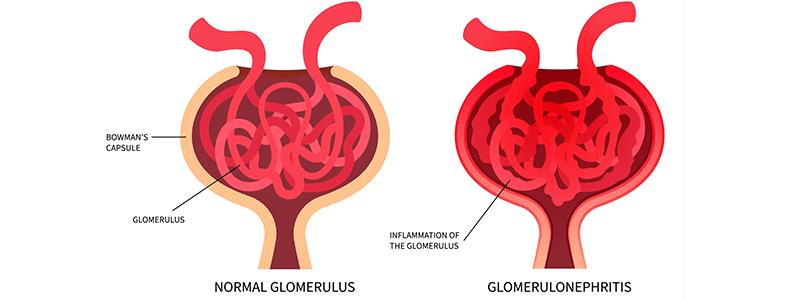Pediatric acute glomerulonephritis (glo·mer·u·lo·ne·phri·tis) occurs when tiny tubes in a child’s kidneys (glomeruli) become inflamed and interfere with kidney function.
Overview
What is pediatric acute glomerulonephritis?
Acute glomerulonephritis results from inflammation of tiny tubes (glomeruli) in the kidney. These tubes act as a filter, cleaning the blood by separating wastes and extra fluid. When the glomeruli do not function properly, waste products build up in blood. Protein and red blood cells also can leak into urine.

Signs and Symptoms
What are the signs and symptoms of pediatric acute glomerulonephritis?
Blood in urine or brown urine
Fatigue
Foamy urine
Inefficient filtering of wastes in the blood (shown in blood and urine lab tests)
Low blood protein
Swelling (edema) of the face, eyes, ankles, feet, legs, or abdomen as fluid builds in the body
Urinating less than usual
Causes
What are the causes of pediatric acute glomerulonephritis?
Acute glomerulonephritis occurs suddenly as the result of an infection, such as strep throat, impetigo (bacterial skin infection), lupus or a bacterial infection in the heart.
Doctors and Providers
 Jyothsna GattineniPediatric Nephrologist
Jyothsna GattineniPediatric Nephrologist Mouin Gerios SeikalyPediatric Nephrologist
Mouin Gerios SeikalyPediatric Nephrologist Elizabeth J BrownPediatric Nephrologist
Elizabeth J BrownPediatric Nephrologist Keri A DrakePediatric Nephrologist
Keri A DrakePediatric Nephrologist Halima Saadia JanjuaPediatric Nephrologist
Halima Saadia JanjuaPediatric Nephrologist Raymond Phillip QuigleyPediatric Nephrologist
Raymond Phillip QuigleyPediatric Nephrologist Smitha Rao VidiPediatric Nephrologist
Smitha Rao VidiPediatric Nephrologist Robin Leigh LandgrafNurse Practitioner - Wound Ostomy
Robin Leigh LandgrafNurse Practitioner - Wound Ostomy